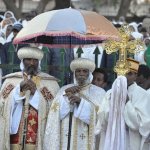Timkat in Ethiopia and Eritrea Date in the current year: January 19, 2026
 Timkat (also spelled Timquat) is the celebration of Epiphany in Ethiopia and Eritrea. It falls on January 19 in regular years and on January 20 in leap years, corresponding to the 10th day of the month of Terr in the Ethiopian calendar.
Timkat (also spelled Timquat) is the celebration of Epiphany in Ethiopia and Eritrea. It falls on January 19 in regular years and on January 20 in leap years, corresponding to the 10th day of the month of Terr in the Ethiopian calendar.In Ethiopia and Eritrea, about half of population belong to one of the two Oriental Orthodox churches collectively known as Orthodox Tewahedo. The Ethiopian Orthodox Tewahedo Church was granted autocephaly from the Coptic Orthodox Church of Alexandria in 1959, and the Eritrean Orthodox Tewahedo Church officially separated from the former in 1993, following Eritrean independence from Ethiopia.
Orthodox Tewahedo churches use the Ethiopian calendar for liturgical purposes. It is based on the Coptic calendar, which is somewhat similar to the Julian calendar used by the Eastern Orthodox Church. Therefore, Ethiopian and Eritrean Epiphany, known as Timkat, generally corresponds to Epiphany in the Eastern Orthodox Church (January 19) but is celebrated on the next day on leap years in the Ethiopian calendar.
Timkat is the celebration of the baptism of Jesus Christ in the Jordan River, which is considered to be one of the five major events in the gospel narrative of Jesus’s life. It is the second most important religious festival in Ethiopia and Eritrea next to the Ethiopian Christmas (Genna). The best-known Timkat tradition is the ritual reenactment of baptism.
One of the most important attributes of Timkat is the Tabot. It’s a replica of the Ark of the Covenant (a chest containing the original stone tablets of the Ten Commandments that was carried by the Israelites during their 40-year journey in the desert). The Tabot is rarely seen by parishioners, but on Timkat, it is paraded in the streets to symbolize the manifestation of Jesus as the Messiah when he was baptized in the Jordan.
On the eve of Timkat (Ketera), the Tabot is removed from the church, wrapped in lavish cloth and borne in procession on the priest’s head. The procession ends at a nearby stream or pool before sunset, where the Divine Liturgy is celebrated around 2 a.m. Some parishioners stay up all night, while others go home to sleep and return around dawn for the blessing of water and the reenactment of Jesus Christ’s baptism.
After several speeches by the important church members, the priest blesses the water with his holy cross and then sprinkles holy water on the participants. After that, lots of people immerse themselves in the pool or stream, which symbolizes the renewal of their baptismal vows. Although the water is quite chilly in the early morning, believers are not afraid to dive in and receive their blessings.
Around noon on Timkat Day, the Tabot is escorted back from the ritual site to the church in a colorful procession with song and dance. Everyone is dressed up in their finest, and the clergy bear golden-rimmed festive robes and umbrellas. After the Tabot is restored to its place on the alter, people go home to share a holiday feast with their families. Traditional dishes served for Timkat include doro wat (Ethiopian and Eritrean chicken stew) and injera (a sourdough-risen spongy flatbread).
- Category
- Religious Holidays
- Country
- Ethiopia, Eritrea
- Tags
- Timkat, Timqat, Epiphany, baptism of Jesus, holidays in Ethiopia, holidays in Eritrea, religious holidays